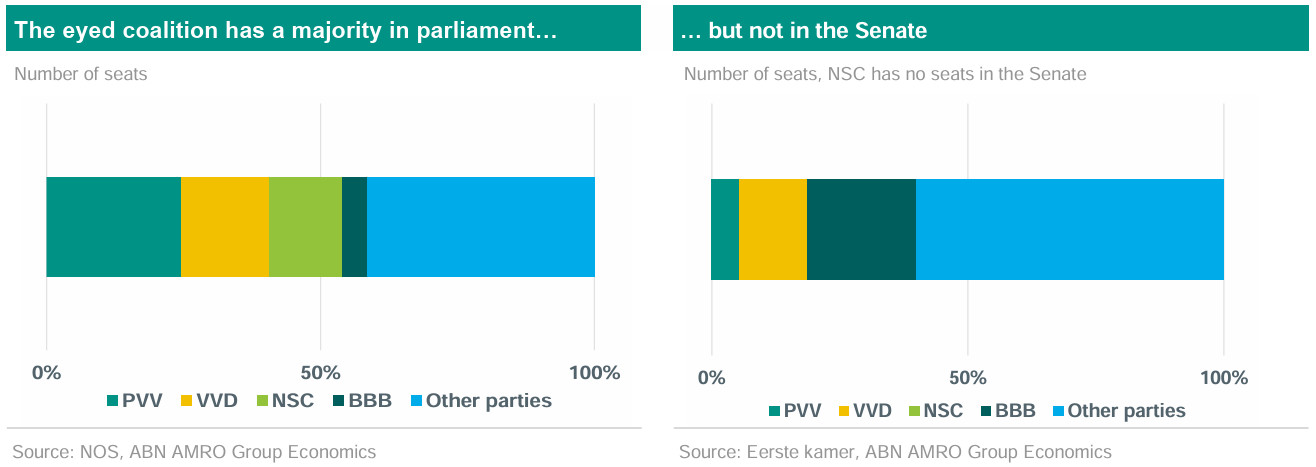Dutch elections: Expected coalition gains new momentum

After the abrupt ending of the formation talks in February, talks between the PVV, VVD, NSC and the BBB to form a right-wing government have resumed this week

Jaap Teerhuis
Senior Fixed Income Strategist
There appears to be consensus over the type of government. A majority coalition is unfeasible, an extra-parliamentary cabinet with a coalition agreement only on headlines seems to be the preferred way to go
Indeed, the new mediator, Kim Putters, announced that the negotiations have reached a next phase where the parties will start negotiations on content…
… of which migration, the international position of the Netherlands and government finances are most important
Government finances seem to be the biggest stumbling block in the negotiations as the PVV and the BBB have a different opinion than the VVD and NSC
Should the negotiations succeed, the government will have a majority in Parliament but will lack a majority in the Senate
Despite a long way to go, the probability of a new right-wing coalition has increased substantially since this week
New momentum for the coalition that was anticipated since the elections
Following Pieter Omtzigt’s (NSC) dramatic exit from formation talks early February (see ), after a month of delays a second wind has taken hold of the process to form a new government. Indeed, under the new mediator Kim Putters, election winner PVV (far-right), outgoing prime minister Rutte’s VVD (liberal centre-right) and newcomers the Farmer Citizen Movement (BBB, right) and New Social Contract (NSC, centre-right) have resumed talks over forming a new government. On Tuesday 12 March, Mr Putters mentioned that the negotiations have reached a new phase as the four parties will start negotiations on substantive topics with the final goal to write a coalition agreement on headlines only.
Since the election results showed a shift of voters to the right, this right-wing coalition was favoured to form a government from the start. Should the formation talks succeed, the new government (PVV, VVD, NSC, BBB) has a majority in Parliament but lacks a majority vote in the Senate. This means compromises will still have to be made to pass legislation through both houses.
Extra-parliamentary rather than a majority cabinet
On Monday 11 March the parties have started negotiations on content and policy. Currently there only appears to be consensus over the type of cabinet. As indicated in our earlier note (see ), chances are high that the coming government will be extra-parliamentary rather than a ‘normal’ majority cabinet. Normally, a majority cabinet has clear ties with the coalition parties and acts according to a well-defined and agreed upon coalition agreement. An extra-parliamentary cabinet, however, has less clear ties with the coalition parties in parliament. Their actions are based upon general policy ambitions in selected areas. As a result, in the extra-parliamentary situation policy ambitions are less well-defined compared to a traditional majority cabinet and more power is given to political parties in Parliament.
Furthermore, this indicates that the party leaders of the four parties will most probably not be part of the new cabinet as they will keep their positions in Parliament. As a consequence, this means that the chance that Geert Wilders will be the new Prime Minister has become smaller.

Government finances, migration and the international position are important topics
There are three areas in which the coalition does prefer concrete agreements: migration, the international position of the Netherlands and government finances. It is not surprising that on these three topics the parties will want to reach an agreement in advance. Disagreement on migration was the reason the previous Rutte IV government fell. On international matters the VVD and NSC take a more constructive position and find themselves in opposition of the PVV, which until recently still advocated for a NEXIT (Dutch exit out of the European Union). Finally on government finances, analyses of party programmes show that the plans of the PVV and BBB will result an increase in spending and this contrasts sharply with the VVD and NSC who instead prefer a more prudent development of government finances going forward. Given the different perspectives on this topic and the importance of the topic, government finances are likely the biggest stumbling block in the current phase of negotiations. The PVV, VVD, NSC and BBB have tried to sound optimistic over the last few days, but it remains to be seen whether they can bridge these differing opinions on such a central theme.
A changing wind in Europe
In terms of the position that the Netherlands will play internationally, the big picture is that the pro-European course of the current caretaker government is likely discontinued. PVV, the election winner, is vocally critical of Europe. NSC and the BBB acknowledge the need to stay in Europe but do take a more critical position than the euro-favoured role of the past government, of which the VVD was part. This was confirmed this week again when news broke that a majority in Parliament ordered the caretaker government to vote against the Nature Restoration Law proposed by The Commission. All in all, the likely new coalition will adopt a more critical attitude towards the European Union.
